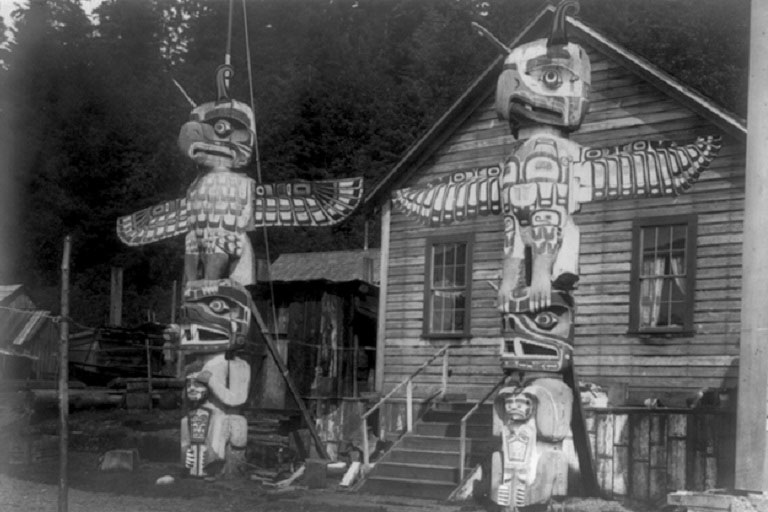Location: Columbia University, New York City, Kwakwaka'wakw People.
Date: 1938
Format: Aluminum disc
Accession Number: 54-235-F
Franz Boas (1858-1942), the father of American Anthropology, and his former student, George Herzog (1901-1983), an important early ethnomusicologist, made 22 aluminum disc recordings of Kwakwaka'wakw Chief Dan Cranmer in 1938. Cranmer was an important cultural activist for his people and in 1938 he was staying with Franz Boas in New York while helping Boas complete a Kwakiutl dictionary. Kwakiutl is the name Boas created for a group of Northwest Coast peoples, but, today, the preferred term is Kwakwaka'wakw. Cranmer had been arrested in 1921 for hosting a gift-giving feast known as a potlatch despite an 1884 Canadian law that made it illegal to do so. Many Kwakwaka'wakw leaders hosted these events anyway in defiance of a law that struck at the heart of their culture and identity. The potlatch was a performative ritual that affirmed their cultural history and established new networks of social status. Caught in a government crackdown in 1921, Cranmer and 48 others were convicted of holding a potlatch and 26 of them spent at least two months in jail. A large cache of gifts, ceremonial masks, and regalia from the potlatch was confiscated by officials and sent out of the community. Boas, who had worked with the Kwakwaka'wakw and other Northwest Coast peoples since the early 1890s, wrote letters of support for Cranmer and in critique of the law. The ban on holding the potlatch was not lifted until 1951. Some of the potlatch regalia was finally returned to the community in the 1980s as part of repatriation agreements with the cultural institutions in Ottawa and New York City that had held the artifacts for decades. They are now housed at the Kwagiulth Museum and Cultural Centre at Cape Mudge and the U'mista Cultural Society at Alert Bay.
Working with Boas and Herzog in 1938, Cranmer recorded several dozen songs and speeches such as stick game songs, feast songs, paddling songs, mourning songs, and many others. Today, approximately 5,500 Kwakwaka'wakw people live in British Columbia and fewer than 250 people today fluently speak the Kwak'wala language. While language revitalization efforts are ongoing, they face serious obstacles to success and the language is in real danger of becoming extinct. Recordings such as these are an irreplaceable documentation of Kwak'wala language use and cultural history.
This recording as well as several others made by Franz Boas over the course of his career-long research with the Kwakwaka'wakw are held at the Archives of Traditional Music. Boas made wax cylinder recordings of Kwakwaka'wakw musicians at the 1893 World's Columbian Exposition in Chicago and on later trips to Fort Rupert and other parts of Vancouver Island.
This collection was added to the 2013 National Recording Registry by the Librarian of Congress.
Chief Dan Cranmer. 1938. "Feast Song" New York City. (54-235-F)
To learn more about the Library of Congress National Recording Preservation Board and to see the full registry visit: http://www.loc.gov/rr/record/nrpb/
Location:

